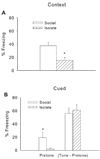Isolation rearing-induced deficits in contextual fear learning do not require CRF(2) receptors
- PMID: 20097235
- PMCID: PMC2832092
- DOI: 10.1016/j.bbr.2010.01.018
Isolation rearing-induced deficits in contextual fear learning do not require CRF(2) receptors
Abstract
Post-weaning social isolation of rodents is used to model developmental stressors linked to neuropsychiatric disorders including schizophrenia as well as anxiety and mood disorders. Isolation rearing produces alterations in emotional memory and hippocampal neuropathology. Corticotropin releasing factor (CRF) signaling has recently been shown to be involved in behavioral effects of isolation rearing. Activation of the CRF(2) receptor is linked to stress-induced alterations in fear learning and may also be involved in long-term adaptation to stress. Here we tested the hypothesis that CRF(2) contributes to isolation rearing effects on emotional memory. At weaning, mice were housed either in groups of three or individually in standard mouse cages. In adulthood, isolation-reared mice exhibited significant reductions in context-specific, but not cue-specific, freezing. Isolation-reared mice exhibited no significant changes in locomotor exploration during brief exposure to a novel environment, suggesting that the reduced freezing in response to context cues was not due to activity confounds. Isolation rearing also disrupted context fear memory in mice with a CRF(2) gene null mutation, indicating that the CRF(2) receptor is not required for isolation effects on fear memory. Thus, isolation rearing disrupts hippocampal-dependent fear learning as indicated by consistent reductions in context-conditioned freezing in two separate cohorts of mice, and these effects are via a CRF(2)-independent mechanism. These findings may be clinically relevant because they suggest that isolation rearing in mice may be a useful model of developmental perturbations linked to disruptions in emotional memory in a variety of neuropsychiatric disorders.
Conflict of interest statement
All other authors have no conflicts to disclose.
Figures


References
-
- Bast T, Zhang WN, Feldon J. The ventral hippocampus and fear conditioning in rats. Different anterograde amnesias of fear after tetrodotoxin inactivation and infusion of the GABA(A) agonist muscimol. Exp Brain Res. 2001;139(1):39–52. - PubMed
-
- Bianchi M, Fone KF, Azmi N, Heidbreder CA, Hagan JJ, Marsden CA. Isolation rearing induces recognition memory deficits accompanied by cytoskeletal alterations in rat hippocampus. Eur J Neurosci. 2006;24(10):2894–2902. - PubMed
-
- Bradley RG, Binder EB, Epstein MP, Tang Y, Nair HP, Liu W, Gillespie CF, Berg T, Evces M, Newport DJ, Stowe ZN, Heim CM, Nemeroff CB, Schwartz A, Cubells JF, Ressler KJ. Influence of child abuse on adult depression: moderation by the corticotropin-releasing hormone receptor gene. Arch Gen Psychiatry. 2008;65(2):190–200. - PMC - PubMed
Publication types
MeSH terms
Substances
Grants and funding
LinkOut - more resources
Full Text Sources
Medical

